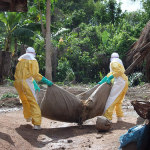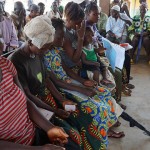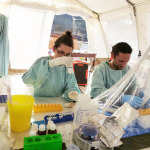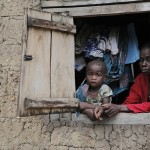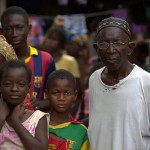This working paper reports on a study to identify epidemic control priorities among 15 communities in Monrovia and Montserrado County, Liberia. Data were collected in September 2014 on the following topics: prevention, surveillance, care-giving, community-based treatment and support, networking/hotlines/calling response teams and referrals, management of corpses, quarantine and isolation, orphans, memorialization, and the need for community-based training and education. The study also reviewed issues of fear and stigma towards Ebola victims and survivors, and support for those who have been affected by Ebola. The findings
Continue reading →
This paper by Anoko J. N., reports on the success of a communication programme among 26 rebellious villages in Forest Guinea during fieldwork in June-July 2014. This was based on listening to complaints and taking into account the customs and culture of those concerned. The main methodologies were socio-anthropological enquiry and action research, based on bibliographic research, observations, formal and informal interviews with resource persons and political leaders from Forest Guinea; women , young and very old people of both sexes, street vendors, restaurateurs, local
Continue reading →
The first round of trials on novel therapeutics for Ebola are set to begin imminently. Members of the Ebola Response Anthropology Platform, Ann Kelly and Clare Chandler, represented the Platform by participating in the WHO Ethics Working Group meetings in September and October 2014 to discuss ethical considerations for trials of new vaccines and therapeutics for Ebola viral disease. At a previous WHO consultation in August 2014, the Panel concluded unanimously that it would be acceptable on both ethical and evidential grounds to use as potential treatments or for
Continue reading →
After long months of relative silence, the world finally heatedly debates on Ebola. The quantity of aid is widely considered to be the major problem. The quality of the aid being offered however, is not under scrutiny. Everybody seems to agree that all the outbreak needs is: more clinics, more medical personnel, more military personnel and central coordination. All this is, of course, necessary. It is questionable though, why and how foreign soldiers will be deployed. The slogan the United Nations uses for the Ebola
Continue reading →
It can be exhausting nursing a child through a nasty bout with the flu, so imagine how 22-year-old Fatu Kekula felt nursing her entire family through Ebola. Her father. Her mother. Her sister. Her cousin. Fatu took care of them all, single-handedly feeding them, cleaning them and giving them medications. And she did so with remarkable success. Three out of her four patients survived. That’s a 25% death rate — considerably better than the estimated Ebola death rate of 70%.
“We are your brothers and sisters, we could never lie to you” says 60-year-old Marianne, as she walks from her motorbike towards a group of angry people in village Katkama. She opens her hand and offers a cola nut and a little money. It is a sign of peace and respect – and, in this case, the gesture works – the villagers begin to listen.
